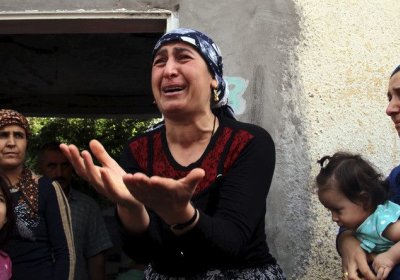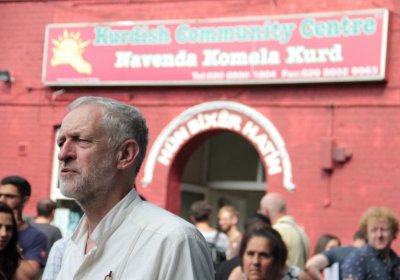In recent days, Turkish President Recep Tayyip Erdogan and Israeli Prime Minister Benjamin Netanyahu have once again been ratcheting up their clash of the colonisers, writes Marcel Cartier.
Kurdistan
Solidarity groups, NGOs and Kurdish Associations are planning a global campaign across Europe, Australia, Canada and the US to materially support the people displaced from Afrin, in northern Syria, after the invasion and occupation by the Turkish military and allied Islamist groups.
The Democratic Autonomous Administration of Afrin Canton in Syria’s north, which is resisting Turkey’s occupation, has warned all Syrians that Turkey’s murderous attack aims at ethnic cleansing.
Turkey’s murderous invasion of the Afrin canton in Syria’s north, backed explicitly or implicitly by Russia and the US, succeeded in taking the canton’s capital on March 18. But Kamran Martin says this is far from the end for the Kurdish-led resistance in defence of the democratic revolution in the region.
The Afrin canton in Northern Syria is under sustained assault from invading Turkish forces and allied Islamist gangs.
The Turkish invasion, accompanied by reports of massacres and use of chemical weapons, aims to destroy the progressive, democratic Kurdish-led revolution in Syria’s north, which places women’s liberation at its centre.
The dark clouds of 21st-century fascism are once again hanging over the heads of the people of northern Syria. As if the inhabitants of the region often referred to as Rojava haven’t suffered enough over the course of the past 7 years of war, the Turkish state has come to the conclusion that the time is ripe to pick up the fallen, bloodied sword from the corpse that is Islamic State.
Together with Salafist mercenaries carrying flags of the Syrian ‘rebels’ – one of the many components of what at one historical juncture seemingly all so long ago was a cohesive ‘Free Syrian Army’ – Erdogan’s regime vows a ‘swift operation’ to destroy ‘terrorism’ in Afrin.
As Turkey’s air force bombed the Afrin canton in northern Syria, causing growing civilian casualties in a region that is home to hundreds of thousands of refugees, British Prime Minister Theresa May signed a new deal worth £100 million with Turkish President Recep Tayyip Erdogan on January 28 to help Turkey develop new fighter jets.
By contrast, the socialist leader of the Labour Party opposition, Jeremy Corbyn, sent a message to a protest against Turkey’s invasion that expressed his solidarity with Afrin and the Kurdish people.
The umbrella organisation of political and social movements in northern Syria, Movement for Democratic Society (TEV-DEM), released a statement on recent attacks and threats by the Turkish state.
Turkey has attacked the Afrin district in northern Syria, which is part of the Northern Syria Democratic Federation that is seeking to create a new revolutionary system of “democratic confederalism”.
A seminar to discuss the challenges, achievements and lessons of the Kurdish-led feminist revolution in northern Syria, in Victoria University on November 4, attracted more than 80 people. It was the second seminar to be organised this year by solidarity activists and the Victorian Kurdish community in Melbourne.
Syrian Democratic Forces (SDF) finally liberated Raqqa, in northern Syria, from ISIS occupation on October 17, after a battle of 135 days. In 2014, ISIS declared Raqqa its capital, which makes its defeat a decisive event.
The SDF is a multi-ethnic and multi-religious armed force made up of dozens of militias that is committed to the political project of “democratic confederalism”, the participatory democratic project associated with the Kurdish-led Rojava Revolution.
Mass protests and strikes have erupted across Rojhilat (Iranian Kurdistan) since September 3, following the killing of two kolbers (cross-border porters who transport merchandise) by Iranian border guards the previous day. The Iranian regime has responded by militarising the area, attacking protests with security forces and pro-government thugs and making mass arrests.
Several Iranian Kurdish organisations and political parties have supported the uprising. They have called for unity between political forces in Rojhilat and with other progressive movements in Iran.
The mood in Turkey is low, and not just among those who oppose President Recep Tayyip Erdogan and his Justice and Development Party (AKP). Even some of his supporters are disoriented by developments in the country.
In the aftermath of the failed coup of July 15 last year, Erdogan orchestrated the dismissal of tens of thousands of government employees. The figures from the ongoing Turkish purges are startling.
- Previous page
- Page 2











